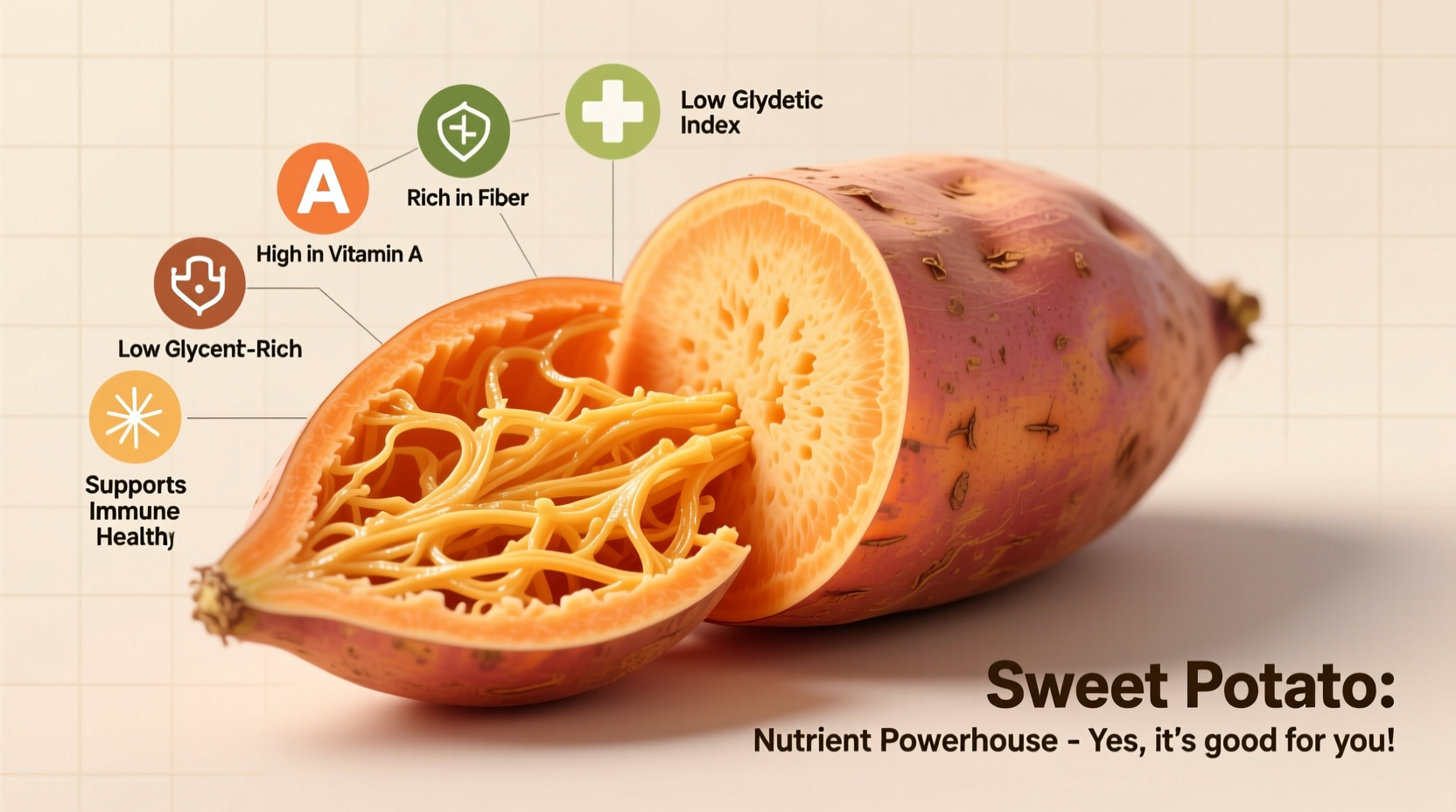Wondering if sweet potatoes deserve a spot in your regular meal rotation? You're not alone. With conflicting information circulating about starchy vegetables, it's time to cut through the noise with science-backed facts. This comprehensive guide delivers exactly what you need to know about sweet potatoes' nutritional profile, proven health benefits, and practical ways to maximize their value in your diet.
Nutritional Powerhouse: What's Inside a Sweet Potato
One medium sweet potato (about 130g) delivers an impressive nutrient profile that outperforms many common vegetables. Let's break down the key components that make sweet potatoes a nutritional standout:
| Nutrient | Sweet Potato (130g) | Daily Value % | Regular Potato Comparison |
|---|---|---|---|
| Vitamin A (as beta-carotene) | 21,907 IU | 438% | Nearly 0% |
| Vitamin C | 22.3 mg | 25% | 17 mg (19%) |
| Dietary Fiber | 3.8 g | 14% | 2.1 g (8%) |
| Potassium | 438 mg | 12% | 535 mg (15%) |
| Manganese | 0.6 mg | 27% | 0.2 mg (9%) |
Data source: USDA FoodData Central
This nutritional comparison reveals why sweet potatoes consistently rank among the top functional foods. The exceptionally high beta-carotene content—which your body converts to vitamin A—supports everything from healthy vision to immune function. Unlike regular potatoes, sweet potatoes provide substantial antioxidants that combat oxidative stress.

Science-Backed Health Benefits You Can Trust
Research from reputable institutions confirms several specific health advantages of regular sweet potato consumption:
Supports Healthy Blood Sugar Regulation
Despite their natural sweetness, sweet potatoes have a lower glycemic index (GI 44-61 depending on preparation) than white potatoes (GI 70-85). A 2020 study published in the Journal of Nutrition and Metabolism found that purple sweet potatoes improved insulin sensitivity in participants with prediabetes. The key is preparation method—boiling preserves more resistant starch than baking, which helps moderate blood sugar response.
Boosts Immune Function Through Multiple Pathways
The vitamin A in sweet potatoes isn't just good for your eyes—it's essential for maintaining mucosal barriers in your respiratory and digestive tracts, your body's first line of defense against pathogens. According to research from the Centers for Disease Control and Prevention, adequate vitamin A intake reduces severity and mortality from infectious diseases.
Provides Gut-Health Supporting Fiber
With 3.8 grams of fiber per medium potato, sweet potatoes deliver both soluble and insoluble fiber. The soluble fiber feeds beneficial gut bacteria, while insoluble fiber promotes regularity. A 2022 review in Nutrients highlighted how sweet potato consumption increased beneficial Bifidobacterium strains in study participants.
When Sweet Potatoes Might Not Be Ideal: Context Matters
While generally beneficial, sweet potatoes have specific considerations depending on individual health circumstances:
- For kidney stone prevention: Sweet potatoes contain moderate oxalates (about 20-30mg per serving). Those with calcium-oxalate kidney stones may need to moderate intake according to National Kidney Foundation guidelines.
- For diabetes management: While generally diabetes-friendly, portion control remains important. One medium sweet potato contains approximately 27g of carbohydrates. Pairing with protein and healthy fats helps moderate blood sugar response.
- For certain medication interactions: The high vitamin K content in some varieties may affect blood thinners like warfarin. Consult your healthcare provider about consistent vitamin K intake if on these medications.
Maximizing Nutritional Value: Preparation Methods That Matter
How you prepare sweet potatoes significantly impacts their health benefits:
The Boiling Advantage
Boiling sweet potatoes with the skin on preserves up to 92% of beta-carotene compared to baking, which can degrade some heat-sensitive nutrients. The cooking water also retains water-soluble nutrients—use it in soups or sauces rather than discarding it.
Pairing for Better Absorption
Vitamin A is fat-soluble, meaning your body absorbs it better when consumed with healthy fats. Try these combinations:
- Roasted sweet potato cubes with olive oil and rosemary
- Boiled sweet potato topped with avocado slices
- Sweet potato soup blended with coconut milk
Avoid These Common Mistakes
Maximize benefits by steering clear of these preparation pitfalls:
- Peeling before cooking (loses fiber and nutrients in skin)
- Overcooking until mushy (reduces resistant starch content)
- Serving exclusively with sugary toppings (cancels blood sugar benefits)
Simple Ways to Incorporate Sweet Potatoes Daily
You don't need complex recipes to enjoy sweet potatoes' benefits. Try these practical approaches:
- Breakfast boost: Dice and roast sweet potatoes to add to morning egg scrambles
- Lunch solution: Cube boiled sweet potatoes into green salads for added staying power
- Smart snack: Slice and bake sweet potato "chips" with minimal oil
- Dinner staple: Replace half your mashed potatoes with mashed sweet potatoes
For those watching carbohydrate intake, aim for ½ to 1 medium sweet potato per serving. The American Diabetes Association recommends including sweet potatoes as part of a balanced plate with non-starchy vegetables and lean protein.
Conclusion: Sweet Potatoes Deserve Regular Rotation
Sweet potatoes offer exceptional nutritional value that supports multiple aspects of health when prepared thoughtfully. Their rich vitamin profile, fiber content, and beneficial compounds make them a superior choice compared to many starchy alternatives. By understanding proper preparation methods and portion considerations, you can confidently incorporate this versatile vegetable into a balanced diet for lasting health benefits.
Frequently Asked Questions
Are sweet potatoes good for weight loss?
Sweet potatoes can support weight loss when consumed as part of a balanced diet. Their high fiber content (3.8g per medium potato) promotes satiety and helps control appetite. With approximately 103 calories per medium sweet potato, they provide substantial nutrition for relatively few calories. Research shows that the resistant starch in properly prepared sweet potatoes may enhance fat metabolism. For best results, prepare them by boiling or roasting with minimal added fats rather than frying.
How do sweet potatoes affect blood sugar levels?
Sweet potatoes have a moderate glycemic index (44-61) compared to white potatoes (70-85), meaning they cause a slower, more gradual rise in blood sugar. The fiber and complex carbohydrates help regulate glucose absorption. Boiling preserves more resistant starch than baking, which further moderates blood sugar response. For optimal blood sugar management, pair sweet potatoes with protein and healthy fats, and be mindful of portion sizes—typically ½ to 1 medium sweet potato per meal for most adults.
Can you eat sweet potato skin?
Yes, sweet potato skin is not only edible but highly nutritious. The skin contains additional fiber and antioxidants that are lost when peeled. According to USDA research, up to 30% of the fiber and significant amounts of nutrients reside in or just beneath the skin. Always wash sweet potatoes thoroughly before cooking with the skin on. Organic sweet potatoes are preferable if consuming the skin regularly, as conventional varieties may have pesticide residues. The skin becomes tender when roasted or boiled and adds texture to dishes.
How do sweet potatoes compare to regular potatoes nutritionally?
Sweet potatoes generally offer superior nutritional value compared to regular white potatoes. They contain significantly more vitamin A (as beta-carotene), with one medium sweet potato providing 438% of the daily value versus nearly 0% in white potatoes. Sweet potatoes also have more fiber (3.8g vs 2.1g) and vitamin C. While white potatoes contain slightly more potassium, sweet potatoes have a lower glycemic index and more diverse antioxidant compounds. Both can be part of a healthy diet, but sweet potatoes provide more comprehensive micronutrient benefits.
What's the healthiest way to cook sweet potatoes?
Boiling sweet potatoes with the skin on is considered the healthiest cooking method. Research from the Journal of Agricultural and Food Chemistry shows that boiling preserves up to 92% of beta-carotene compared to baking, which can degrade some heat-sensitive nutrients. Keeping the skin on adds fiber and nutrients. If roasting, use minimal oil (1-2 teaspoons per potato) and avoid high temperatures that create acrylamide. Never fry sweet potatoes, as this adds unnecessary fat and calories while reducing nutritional value. For maximum nutrient absorption, pair cooked sweet potatoes with a small amount of healthy fat like olive oil or avocado.











 浙公网安备
33010002000092号
浙公网安备
33010002000092号 浙B2-20120091-4
浙B2-20120091-4